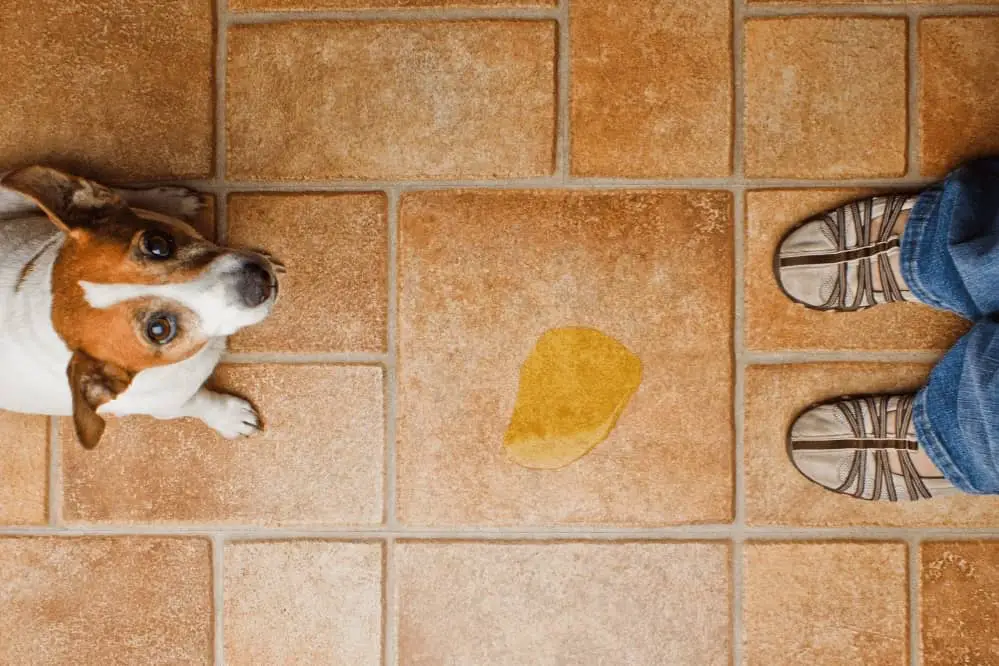If you are a little late in terms of house training your dog, you may end up with an adult dog that still pees in the house. This is of course not a good thing, as you’ll end up cleaning puddles; it stinks, and it can ruin clothing, floors, and furniture too.
Having an adult dog that pees in the house is not very common, especially if you did go through a house-training program. However, this does occur.
Sometimes dogs don’t understand house training; sometimes they may have fear or anxiety issues which can cause urinating in the house, or they may have medical conditions. So, how do you get a dog to stop peeing in the house?
Start With House Training
If you have a dog that pees in the house, you need to do house training all over again. Whether it is a puppy that has never been house trained or an adult that seems to have forgotten, this is the first step you should take. You should look up house training techniques in this regard.
If your dog is still young, the issue may be as simple as that the first round of house training did not take hold. Some dogs take longer to learn than others, so you might have to be patient and continue with a solid house training regimen.
Take the dog outside every half hour and always reward it when it does its business outdoors. This is a rudimentary explanation of how house training for dogs works, but there is a bit more to it.
Monitor Water Intake and Provide Potty Breaks
Even if your dog is fully house trained, if you notice that it drinks lots of water, but you don’t let it out often, your dog will need to pee a lot. Not all dogs will notify you when they need to go out to pee.
Therefore, if you have a dog that drinks a lot of water, but you don’t let it out often, you can easily imagine what will happen next. Try to limit the dog’s water intake while simultaneously increasing time spent outdoors.
What About Fear and Anxiety?
Dogs which are fearful or anxious are often known for having mishaps in this regard. Dogs can have so called accidents due to immediate fear or anxiety. Humans are also known to have these accidents when faced with extreme circumstances.
Dogs that come from shelters or kennels often have these sorts of anxiety issues, especially if their previous owners did not treat it right. Dogs can also become anxious of loud noises like thunder, fireworks, vacuums, loud engines, and anything in between.
The best thing to do is to ignore the accident altogether when it happens, while at the same time giving your dog plenty of rewards and praise when it pees outdoors. This will reinforce the good behavior. Of course, if you want to prevent it from happening again, you will need to address the anxiety and the underlying cause.
Don’t Forget About Medical Conditions
If you have a dog that is older and it has generally been good and then it suddenly starts peeing indoors, there is most likely some sort of medical condition to blame.
Dogs that are well past their prime will often start to lose control of their bladder, they may start suffering from mental issues and forgetfulness, or there may be hormonal changes. If a dog that has not peed indoors for years all of a sudden starts doing so, then there is probably a medical condition to blame.
In older dogs, things like Cushing’s disease, kidney disease, urinary tract infections, and other such conditions which can cause incontinence become increasingly common with age. To determine if your dog has a medical condition, get it checked out by a vet.
The Routine
Another great way to stop a dog from peeing indoors is to establish a solid routine. Dogs really like structure and routine. If you don’t have a good routine, the dog may pee indoors because it does not know when the next time it can go out will be.
If you sometimes take the dog out a 5 a.m. and sometimes at 10 a.m., this is a problem. A dog’s body and mind will adjust to a certain routine, something that is essential to house train any dog.
Conclusion
A puppy that pees in the house is normal and can usually be solved with nothing more than a good house training program and a bit of patience. However, in older dogs that suddenly start peeing indoors, you want to look out for medical issues, fear, anxiety, and more.

